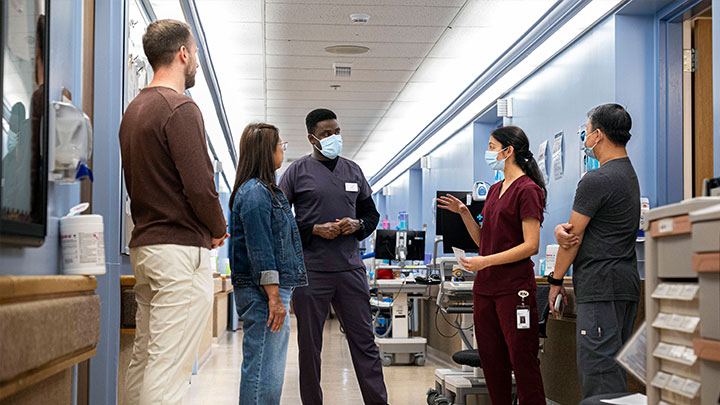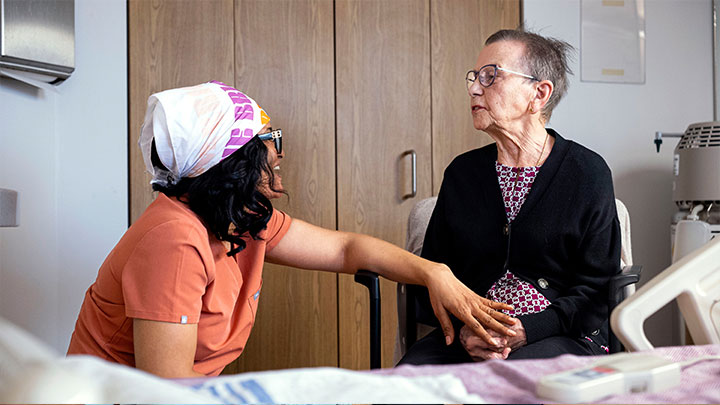
October 30, 2023

The Unit 3D team huddles to discuss patient care at the Glenrose Rehabilitation Hospital. From left are: Doran Walker, Debbie De Guzman, Idiris Bashiir, Kamaljot Mangat and Eric De Vera. Photo by Evan Isbister.

Glenrose patient Elke Kanehl enjoys a What Matters To You conversation with Diana Tarh, her Licensed Practical Nurse. Photo by Evan Isbister.
Story by Katie McLaughlin | Photos by Evan Isbister
EDMONTON — Healing the workforce and improving the relationship between patients and health professionals matters to Doran Walker, a patient care manager at Edmonton’s Glenrose Rehabilitation Hospital. It drove him to accept funding from the Glenrose Hospital Foundation for a special project focused on staff engagement and patient experience.
“The pandemic really impacted our workforce and the experiences of our patients, and I saw an opportunity to start repairing that through small actions,” says Walker.
“Our project is focused on increasing patient satisfaction and staff engagement. One of the ways we’re doing that is by looking at how the two intersect — and how making meaningful connections with our patients and with each other may impact both.”
Walker and his team identified the factors that affect the patient experience by reviewing patient surveys and doing journey mapping with some patients. Three things stood out as having the most impact: being listened to; having influence over their care; and having quality facetime with their nursing staff.
From there, the team identified some opportunities for change.
One of these opportunities is to increase the connection between patients and healthcare providers by having daily What Matters to You? (WMTY) conversations. In September, Walker and staff on unit 3D, a rehabilitation unit for older adults with stroke beds, started having these conversations with their patients, many of whom stay for one to two months. Unit 4C, also a rehabilitation unit for older adults, joined their efforts in early October. Combined, these units care for more than 75 patients.
“WMTY is a worldwide campaign that Alberta Health Services (AHS) has adopted that encourages meaningful conversations between those who provide and receive healthcare,” says Karen Binns, a senior consultant with the provincial Engagement and Patient Experience team. “’What matters to you?’ is a simple question that can have a powerful impact on patients during what is often an extremely difficult time in their lives.”
Every day at 9 a.m., unit staff have a morning huddle. Afterwards, each nurse has a WMTY conversation with their patients. At the afternoon huddle, they share with one another how the conversations went — what action items are required.
If there’s anything that needs to be done for the patient, it should be done by the 3 p.m. bedside shift report. All the patient needs or concerns are added to a dashboard, which helps Walker keep track of themes or trends that they can address further.
WMTY conversations have produced a wide range of results so far, with some outcomes that are easily addressed —such as wanting an extra glass of orange juice, a warm blanket or more recreational activities—while others offer a deeper insight into how a patient is feeling that day, like loneliness, fear about their rehabilitation or even anger about a life-changing diagnosis.
Those conversations, Walker says, lead to a deeper dive with the patient and collaboration with staff and other physicians on follow-up strategies to ensure the patient is supported through whatever they’re struggling with, as best as possible. This might mean setting up follow-up visits with physicians, calling family to arrange a visit or assisting patients with their exercises outside of therapy so they feel more confident.
“While the outcome of some of these WMTY conversations might seem small, our patients are being heard and are being given an opportunity to have more influence over their care,” says Walker. “WMTY provides us with important moments of connection, which is something we all want. We’re making it a priority through these daily conversations.”
“There’s a difference between when a nurse is doing tasks and when we’re making a connection,” says patient Elke Kanehl. “Being conscientious, remembering details and speaking to me more like a friend makes a world of difference.”
Already, Walker is seeing positive results and credits staff on both units for fully embracing this work. Patients have more quality face time with nursing staff and more involvement in their care. There’s a noticeable shift on the unit to a more collaborative feel, where patients and staff are talking and working together more often.
“So often our patients don’t want to seem like a burden by asking for things they need or expressing their concerns or fears with us,” adds Walker. “When we ask them the right questions, it gives them an opportunity to tell us what’s important to them, what they need, how they feel and how we can help them. They feel heard, and that’s an important part of a positive patient experience.”
Walker says he hopes this approach, and other work he’s doing as part of his project, can eventually be implemented across the hospital. He also plans to write a white paper to share across AHS and Canada, in hopes that the work being done on his units will inspire others to make similar changes.
AHS is celebrating Patient and Family Centred Care (PFCC) Week from Nov. 6-10, 2023, and this year’s theme is partnership. WMTY conversations are an example of PFCC in action and are a just one example of how we can partner with our patients for better healthcare experiences.